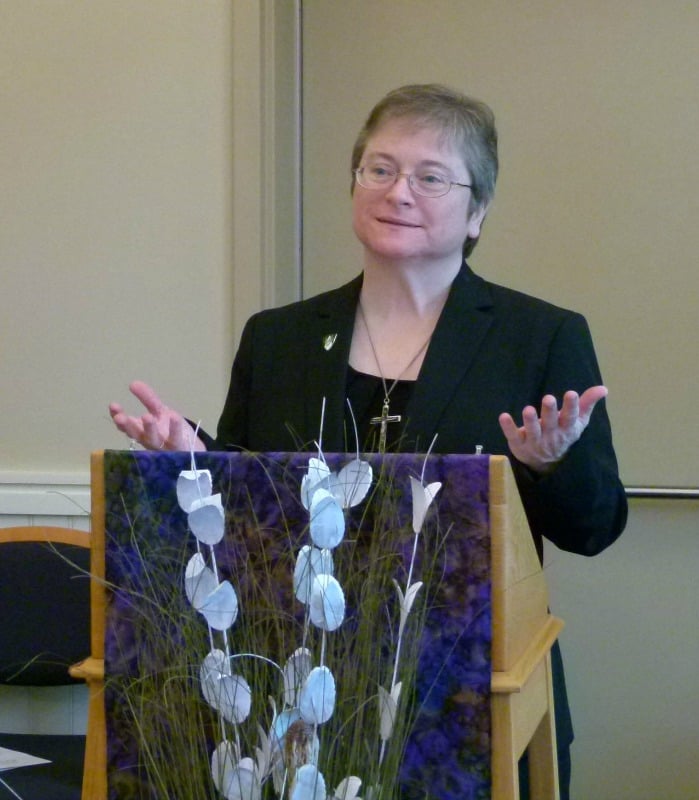 A new research report, released today, brings to light the ways that Catholic sisters use the internet for vocation outreach and identifies key areas for further growth.
A new research report, released today, brings to light the ways that Catholic sisters use the internet for vocation outreach and identifies key areas for further growth.
The first-of-its-kind study was commissioned by A Nun’s Life Ministry (NL), a leader in the use of internet and social technologies for vocation outreach. The study was conducted by the Center for Applied Research in the Apostolate (CARA), based at Georgetown University, and was funded by the Conrad N. Hilton Foundation.
The study’s purpose was to identify ways to strengthen and support the internet outreach efforts of Catholic sisters on behalf of vocations. The research is based on responses from 257 institutes of women religious and 6,833 individual sisters from across the United States.
The research showed that most institutes of women religious have an online presence, most commonly via their website and on Facebook. Sister Maxine Kollasch, co-founder of A Nun’s Life, noted that institutes themselves are very aware of the importance of the internet for vocation outreach and are eager to further use the internet to connect with women discerning God’s call, including a call to religious life.
In turn, young women also look to the internet in their discernment process, a point underscored by a separate 2016 survey of women entering religious life in that year. The survey found that the internet is now one of the most common ways that women first become acquainted with the institute they enter. CARA’s Dr. Mark Gray, a principal author of the A Nun’s Life report, noted that today, “reaching women interested in religious life online is a real necessity for institutes looking to grow. This is where the next generation of women religious is already searching.”
“A Nun’s Life was interested in a research study about institutes’ online presence to gain insights into what might be helpful across the board for vocation outreach using the internet,” said Sister Julie Vieira, co-founder of the ministry. “A Nun’s Life shows the diversity of religious life,” added Sister Vieira, “and one way we do that is by directly involving sisters from many different institutes in our blogs, podcasts, and videos, and in our social networks.”
Sister Christine Carbotte met A Nun’s Life in 2011 when she was actively researching religious communities on the internet. An extensive presence online, especially through social media, better enables institutes to connect with those called to religious life, she said. Sister Carbotte, who took her first vows with the Sisters of St. Joseph in Canada last October, commented, “Having social media gives (discerners) an outlet to find out what's going on in the community's life.”
Melissa Cessac, who is in formation with the Congregation of Divine Providence in Texas, turned to the internet when she began discerning a call to religious life because there were very few nuns in her home diocese. “I was interested in communities that showed aspects of sisters in ministry, and sisters who blogged about their own experiences,” she said. “Social media is the way of today. An online presence is essential because that’s where everyone goes to gather information.”
Online presence to connect with a younger demographic
Institutes of women religious continue to explore how best to use digital platforms in their vocation outreach. Institutes report that in particular their vocation promoters are “very much” eager to learn more about online presence. They desire to be present to and connect with young women in social networks. At the same time, however, there are a number of challenges.
- Institutes are online, but typically not in the social channels utilized most by a younger demographic that may be considering religious life.
- Institutes are much less likely to use social platforms such as Pinterest (14%), Instagram (11%), Snapchat (4%), or chatrooms (4%) – those which are popular with a younger demographic.
- While the overwhelming majority of institutes surveyed has an online presence, it is mostly their own website (92%) or Facebook (70%).
 Sister June Fitzgerald, OP, Vocation Minister for the Dominican Sisters of Peace, welcomes a novice at a 2015 ceremony. Photo Courtesy of The Dominican Sisters of Peace. Used with permission.
Sister June Fitzgerald, OP, Vocation Minister for the Dominican Sisters of Peace, welcomes a novice at a 2015 ceremony. Photo Courtesy of The Dominican Sisters of Peace. Used with permission.
The research study shows that institutes value social media as a way to understand young people today. The Dominican Sisters of Peace are a case in point.
Each day, a member of the Dominican Sisters of Peace staff checks the congregation's Facebook page to review comments and respond to posts from users. The congregation is also active on Twitter, Instagram and YouTube. It maintains a website and blogs and buys online advertising.
“Social media allows the discerner to interact with us at a pace and distance that they find comfortable,” said Dominican Sister June Fitzgerald, vocation minister for the Dominican Sisters of Peace in New Haven, Conn. “They can post, respond, send a message--or simply read, observe and learn. Being a part of a media that they use every day helps reinforce the message that they may be receiving in their heart and creates a non-threatening way to learn more and ask questions.”
The research findings also show that institutes would like more sisters in addition to vocation promoters to be actively involved in using the internet for vocation outreach. The institutes say that their sisters and vocation promoters would benefit from training in areas such as: using social media platforms, understanding the culture and language of social media, navigating the internet in general, using computers and mobile devices, translating the language of religious life for online communities, and using analytics.
In addition, for the vast majority of institutes there is a need for a stronger approach to strategy and implementation.
- Most institutes (76%) lack a plan that identifies strategies and desired outcomes for vocation outreach on the internet.
- Many institutes lack the capacity to update vocation content regularly (54% update the content less than once a week).
- Less than half of the institutes do not use web analytics to optimize their vocation outreach efforts on the internet.
[tweet "#Catholic sisters find training in online content to connect with young women @anunslife"]
Training Catholic sisters in producing online content and connecting with young women
The research points to an opportunity to provide sisters with training to produce their own online content, offering a first-person perspective of religious life. Of the sisters who use blogs, chatrooms, podcasts, YouTube, etc., most are consumers of content; few report that they have experience in producing content.
“The new research study highlights both the need for and desire of religious institutes to receive increased training and resources to enhance vocation outreach, especially on the most promising platforms,” said Sister Kollasch. “With over 10 years of vocation outreach with the online community, A Nun’s Life continues to put its experience and now this research in service to religious institutes. Our plan is to collaborate with others to create resources that will benefit Catholic sisters in reaching out to help people find their path in life and respond to God’s calling.”
To download the executive summaries of the institutes and sisters survey research, visit aNunsLife.org/researchstudy or click here.
About A Nun's Life Ministry: A Nun’s Life Ministry (NL) is an internet-based ministry at aNunsLife.org and on social media. The ministry was founded in 2006 on the belief that each person is called by God to a vocation that enriches the individual and the world. A Nun’s Life fosters a culture of vocation online by engaging with people from 150 countries about spirituality, discernment, religious life, and many other topics. A Nun’s Life also works with religious institutes on using online presence for relationship building. A 501(c)(3) organization with global outreach, A Nun’s Life Ministry is based in Toledo, Ohio.
About the Author

Guest
We welcome guest contributors who graciously volunteer their writing for our readers. Please support our guest writers by visiting their sites, purchasing their work, and leaving comments to thank them for sharing their gifts here on CatholicMom.com. To inquire about serving as a guest contributor, contact editor@CatholicMom.com.


.png?width=1806&height=731&name=CatholicMom_hcfm_logo1_pos_871c_2728c%20(002).png)
Comments